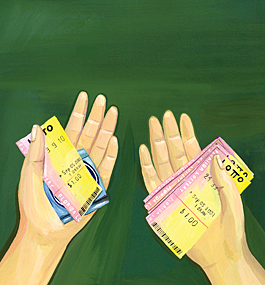Turning Points
Six Numbers

Giselle Potter
by Shirley Press ’73
On September 5, 2001, I went to the gift shop in Jackson Memorial Hospital and bought six Florida Lottery Quick Pick tickets along with my favorite candy, a York Peppermint Pattie. It was an utterly routine purchase for me.
The next day, one of the pediatric emergency department nurses I work with said, “Dr. Press, did you hear that someone from Jackson won the lottery?”
“Wow,” I said, my eyes widening. “Who is it?”
“The winner hasn’t come forward yet. All we know is the winning ticket came from the gift shop.”
Could it have been one of the people I was in line with, I wondered. Maybe the woman with the six kids? I certainly didn’t have that kind of luck. I’d been playing the Florida Lottery for years, and I’d never won more than $9.
More colleagues joined us, and we talked about the impact sudden wealth would have on someone. “That person is going to be such an oddball,” I said. “They’re not going to be able to fit in anywhere.”
Later, new information circulated around the hospital: The winner had purchased six tickets. For the first time, I considered the possibility that I had won. Surely I wasn’t the only person who’d bought six tickets at the gift shop yesterday. Still, this detail did narrow down the crowd. Believing I’d left the tickets at home — in fact, they were in the pocket of the lab coat I was wearing — I didn’t try to solve the mystery right there and then.
When I arrived home, my husband and children had already finished dinner. After eating my microwaved Stouffer’s frozen entree and locating the tickets, I got the morning paper to check the numbers.
The first three winning numbers were 3, 9 and 10. One row of numbers on one of my tickets started with 3, 9 and 10.
My heart jumped just a little. Wow, could it be? I knew the winning ticket was sold in the gift shop. I knew there was only one winner. I knew … oh, stop it! I laughed out loud at the thought of my winning. Never; not me.
I chuckled again — but now my heart was pounding — and looked at the other three numbers: 24, 33 and 35. All six numbers in the newspaper matched the numbers on my ticket. With my eyes bugging out, I must have looked like a Looney Tunes cartoon character. I checked again and again. I was the winner of the $56.37 million jackpot (which turned out to be a $17.5 million jackpot after I took the money as a lump sum and paid all the taxes).
The second I discovered I had won, I knew my life was going to change forever. Naively, I thought that meant everything would be perfect. Little did I know I was about to embark on a remarkable yet perilous journey.
About four years ago, I decided to write a book about that journey. “Pressing My Luck” is about my life before and after the giant fake check was stuffed into the garage: being the child of Holocaust survivors; growing up in Camden, New Jersey; breaking into Paul McCartney’s house in London with several other Beatles fans in 1970; practicing medicine.
I also share how the lottery money didn’t protect my family from life’s struggles, such as my husband’s near-fatal illness and my son’s drug addiction, not to mention our continuing attempts to dodge all types of con artists.
So, in a nutshell, what did I learn from my windfall? First, go slow — don’t make any radical decisions quickly after huge changes occur. Also, the friends worth keeping are the ones who are there for you in good times as well as bad. Age and health are truly life’s great equalizers, not money. Finally, take — and make — all opportunities that come your way, even if you fail.
There were plenty of negative aspects to winning the lottery. I lost friendships because of jealousy. My life was threatened. And there were also so many positives. I had time to do things I always wanted to do, such as going on a medical mission to the Dominican Republic, creating a foundation for Holocaust survivors and writing my book.
In the end — and I can hardly believe it, even though I’ve lived it — most of the confidence and personal growth I once thought were due to winning the lottery could have been achieved without all that money. I just didn’t recognize it then. Only in hindsight did it become clear to me.
Shirley “Sher” Press still works as a pediatric emergency physician at Jackson Memorial Hospital in Miami. Her memoir, “Pressing My Luck,” was published last year.
